When I connect with Adam Thompson, lead singer of We Were Promised Jetpacks, he’s in the process of going back in time. Thompson reaches me over Zoom from Edinburgh where he’s currently staying with his mom, dad and brother, just like old times. This, in and of itself, isn’t entirely unusual (Thompson moved to Manhattan last fall in the midst of the pandemic). But my chat with Thompson also comes one day after he and his bandmates turned back the clock to 2009, reflecting on the band’s much-loved debut album THESE FOUR WALLS as part of the popular Tim’s Listening Party Twitter series. Run by Tim Burgess of The Charlatans, it’s a deeply personal way for bands to look back on popular albums, tweeting out reflections in real-time as the record plays.
While at least a couple tracks off THESE FOUR WALLS remain iconic more than a decade after its release, I’m most curious to hear from Thompson about the Scottish band’s latest album, ENJOY THE VIEW, which recently came out on Big Scary Monsters. Seeds of the album were planted starting last March, passed around as digital sound files. The band eventually built out these songs more fully once they could rehearse in person again last June. And in late August of this year, the trio was able to play these tracks live properly as they rehearsed for as-yet-unreleased music videos.
ENJOY THE VIEW has its share of heavier tracks and sharp guitar parts, hallmarks of the band’s sound, but quiet, reflective moments and meditations on past and current relationships (Thompson is newly married, as well) give it a different feel. Amidst hook-laden singles like the optimistic “Fat Chance,” there’s one other, crucial difference: It was recorded as a trio following the (amicable) 2019 departure of guitarist Michael Palmer. The album sounds anything but flat, and never sounds like the band is down a man. ENJOY THE VIEW is full and lush, with crystal-clear production in spades.
It’s another chapter in the band’s story, one that started in high school in Scotland nearly 20 years ago. ENJOY THE VIEW is another fitting entry in the We Were Promised Jetpacks discography, and a mature and evolved record, at that. In this interview, Thompson offered his insights on recording an album during a pandemic, bringing the band’s sound forward into 2021 and the joy of having a crowd sing your own lyrics back to you.
First and foremost, this album was recorded as a trio, a definite change of pace for the band. Tell me more about that experience.
Adam Thompson: I flew back from New York on March the 23rd, and I think when I landed and turned my phone on, it was, like, Britain is going into lockdown, and I was like “whoa, this might last longer.” So from that point, we knew we were going to use that time to record an album. We planned to do that anyway—we were going to do a little bit more tuning before recording at the end of the year, but it was like just shifted focus… let’s make sure we use this time, however long it is, to make sure we write and record an album, so we pretty much started from scratch. Everything for this album was different from the start. The way we write music is, if someone started a song, we’d go into a room together and chat or play the same piece of music for like, an hour and try to remember what you were playing. That was often how we’d write a song, and we’d try to distill that into a four or five-minute song, it was all happening live. We never finished a song unless all four of us were there. So in the early stages before the pandemic, when we’d play together, the three of us, it was weird-it sounded really empty.
When Mike left, it was really weird to try and imagine that space, but once we got our head around it and realized it gave us a little more room to do things individually. It was really different and we never used to write by sending GarageBand projects to each other, but that’s how we started (this record). It was really good fun doing it like that, definitely a different exercise. It allowed everyone time to really fine tune their parts. It was all different for us.
The opening song “Not Me Anymore,” which has a dreamlike quality to it, gripped me right away. Those lyrics “Don’t teach me / Don’t preach to me,” seem to set the tone for the new direction—would you say that’s accurate, was that intentional?
AT: Yeah, a bit of both. That song’s quite funny because a week after we finished recording our fourth record, the one before this one THE MORE I SLEEP, THE LESS I DREAM, I actually met (my wife) Becky back in New York and I went to stay with her and I wrote this song on my iPad and forgot about it for a long time. I came in thinking I was going to do this side or solo project, I wasn’t going to play guitar—I was just going to sing, and, like, do something really different, and I kind of forgot about it. When we came back to do this album, I sent it to the guys… we sort of started playing it and thinking about it, it started to make sense to be first. It’s just a new direction, something different. I was feeling different, and the whole “not me anymore” was really something that I was going through at this time, a sort of shedding of your past self, or allowing yourself to move on or look to the future, and kind of hopeful.
You can reinvent yourself, or recreate and keep going. It kind of, for a few reasons, seemed to be the one that came first.
I loved the lead single, “Fat Chance,” and it’s got a different feel to it that still sounds like We Were Promised Jetpacks, just brought forward into 2021, perhaps. What was the process of crafting that song like?
AT: We’d spent three months writing and sending demos to each other, and then people were allowed to go back to work, so, we were like, what we do is work, so we went into the studio and we got to spend two months, it was actually really nice. Usually we share the studio space with a bunch of other people… but because we hired a lock-up place there, we were allowed to leave all our (gear) set up. It meant Monday through Thursday, we were going in and writing, and that was one of the first ones that popped up. I absolutely love when a song comes out of nowhere, I just put my hands on the guitar, strummed a couple of things, Dan started playing the drum beat and it was, like, “There’s something here”… The kind of theme of the album was not overthinking it too much and keeping it relatively simple…. Keep it quite light and positive, which is what we wanted to do for this record. We’ve done quite a lot of dense, darker stuff, and we really wanted this album to be lighter in tone both musically and lyrically.
We sent it to our booking agent, he was one of the first ones we sent it to, and he was like “It’s a lot lighter than the pandemic record I expected.”
Do you think you would have made a lighter record in that sense if you hadn’t had more of that extra time?
AT: Slightly, yeah. We’ve never done a record that has been so all-consuming, we’re all sort of doing other jobs or have other things going on, but this one was, well, we all work in the service industry and those things were all closed, so it was full focus on writing music, which is what we obviously want to do at all times anyway. The pandemic kind of did give us a lot of time to think about it, and also because we were chatting so much about the songs, perhaps we communicated more than we normally do.
We spoke about wanting to do a lighter record. We leaned in the other way, let’s make it lighter, let’s bring in some keys and synths. When you’re playing something over and over, and you feel it’s getting better each time… it’s so much fun to play, having this moment with little, subtle changes that you notice. We could be a little bit more clinical. It really was a fun experiment for us that ended with an album.
In terms of creativity or storytelling, or a through-line, do you see any between your 2018 LP, THE MORE I SLEEP THE LESS I DREAM, or do you view this as a restart, in a way?
AT: I kind of really view it completely separately… I really like THE MORE I SLEEP THE LESS I DREAM, and it might be my favorite album that we’ve done. It took us a long time, three years or so of writing. We almost felt we were down and out, lost management, left our label, we really had to dig deep… This one was definitely a bit more experimental, and we weren’t 100 percent sure how the final sound of it was going to come out. I’m glad we did THE MORE I SLEEP THE LESS I DREAM when Michael was in the band, and that was like a really nice last chapter of that, because we nailed exactly what we were wanting to do. It does feel quite a bit different.
I found parts of this album really thrilling and spot-on in the emotions they capture, and very reflective and poignant—“What I Know Now” in particular. Did that song spring from anything in particular?
AT: Yeah, that was one that Sean on bass started and it was always a really chilled out song, and we would play it, it was one where we’d turn the lights off in the practice room and play it for like an hour. That song, for the most part, and the album is trying to be positive, and if it happens, it happens. It was weird because lyrically, I didn’t want to have to think back or go back to a place where I felt utterly depressed. Often, that’s where I’ve got my source of lyrics and material from is trying to express those feelings and emotions. When it came to this album, I wasn’t willing to do that, I didn’t want to go back to that, I just wanted to move on and be good.
I find it hard to write a song that’s overly positive… “What I Know Now” was thinking back to that time. I had an image of being back in my old apartment, late at night after, y’know, not particularly taking care of myself, drinking too much, I’m not sure. If I could just go back to that guy then and give him a shake, like, “it’s going to be alright,” and that was kind of what I was trying to get across. The essence of the song was really strong, and it was one that we decided to not chop too much fat off, and have a point of the album where you can relax a bit.
Let’s rewind the clock a little bit. You recently participated in a Tim’s Twitter Listening Party, the Twitter listening sessions run by Tim Burgess of Charlatans. It’s a popular pandemic activity with which to follow along, looking back at iconic albums with input from the bands themselves. You celebrated your debut album, THESE FOUR WALLS, with some really interesting reflections on it. What was that experience like?
AT: It was nice, it was all of us over at Sean’s flat. We listened to the album during the day and wrote about some draft tweets for the songs, and that was Tim’s advice, because it goes by really quick. We had some thoughts ready, we were trying to interact with people as much as possible.
It was really nice, it was basically an hour of compliments *laughs*. It was a nice reminder of where and when and how we felt when we started. We were really grateful to Tim for asking us.
I want to also ask about the cover photo for the album, which was snapped in the fading light and has become pretty recognizable and memorable. Take me through that story.
AT: Dave Thomas who did the artwork, he stole the show (during the Twitter listening party). The artwork is great, we’ve always loved it. A lot of people think it’s a graphic or drawing, but it’s actually a real place in England. Dave got loads of different shots he took that day, and it was really interesting stuff. He showed how he did the handwriting for it: He did it with his wrong hand, upside down, so it’s just little details like that to make it not his handwriting and a little bit different. We love working with Dave, he did the artwork for our new album as well.
Off of that album, you’ve delivered some classic late-aughts rock songs, including “Quiet Little Voices” and “It’s Thunder and It’s Lightning.” Over the years, those songs have taken on quite a life of their own. What has it been like to see that process play out?
AT: Really good! It’s weird with “Quiet Little Voices”—when we were younger, I definitely went through a phase of “fuck that song” *laughs*. That’s the only song people want to hear, we’re so much more than that. But you get a bit older and do it a lot longer, and you’re like “Hey! People really like that song! That’s great.” I remember a couple years ago, we were talking to our booking agent in Chicago about some other band, and he said, “how depressing is it that the biggest song I ever wrote, I wrote when I was 19, and I’ll probably never write another one,” and he looked at me and was like “you know what I mean?” *laughs*, and I was, like, “yeah, wow, I suppose. I’ve never really thought about that.” It’s weird, some songs these days take months, you know, so long to try and get the right parts together or overthink something, but that one… I can remember exactly where we wrote it because it was just, like, in a day in this old garage.
I remember having three chords for it, and I remember, we should probably have a different section at some point, and then the first thing I played is the little bridge section, and that’s the song. It is interesting, I don’t know what it is about the human mind but we somehow hit the right combination of sounds and things at the right time that, straight away, people were, like, “I love that song.” Which was weird for us at the time, because we were begging friends to come and see us, selling friends tickets for three pounds. And we did that song and people were like “wow, you guys are actually pretty good!”
I think we’ll always play it live, it’s so fun to see people freak out and sing along so hard. It’s something we share with people that have connected with our band. Those moments are so precious. I’m looking forward to that feeling again.
Having seen those songs played live has been quite the experience over the years. On another note, you just made the decision to postpone your 2021 U.S. Northeast tour. But when you finally do hit the stage, I’ve got to imagine it’ll feel pretty incredible.
AT: Yeah, I think the tour now next March is going to be about six weeks long, which is just about our maximum before it becomes not that much fun anymore. It’s going to be a big tour, definitely looking forward to that. We want to tour more consistently. I think I worked out over the last five years, we’ve only done a total three months (combined) of touring, which is not a lot for a band that makes money touring. So we need to get out there and get playing, and we want to do that. We’re rearing to go and want to tour regularly and write regularly and release music more regularly.
We were really sad about November and filled with anxiety. If one of us gets COVID, the whole tour’s cancelled and we’ll probably go bankrupt (laughs).
So between now and then, do you have plans to record?
AT: Yeah, we’re trying to use the time smartly. We do have a U.K. tour in December… I think we’d like to do some sort of EP that we can release later on, maybe with some reworked tracks or stripped-back vibes, and we’re already trying to think of the next album, because we recorded this album in September/October last year, and it was mixed and mastered by the new year. In my head, I’d love to do a full year’s worth of touring next year and early in 2023, try to record another one and keep it going.


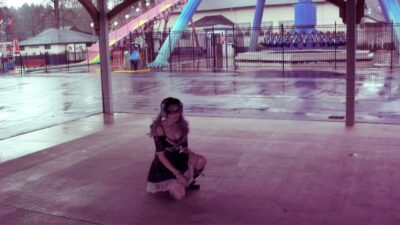

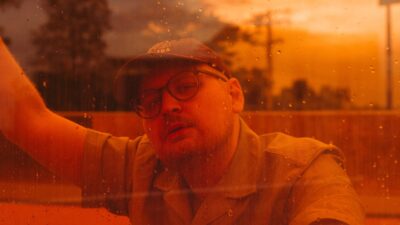
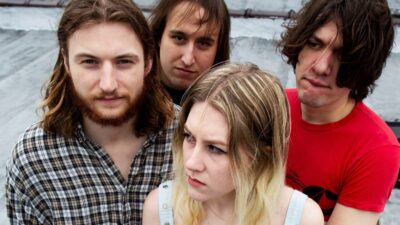

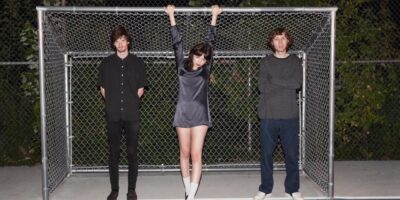

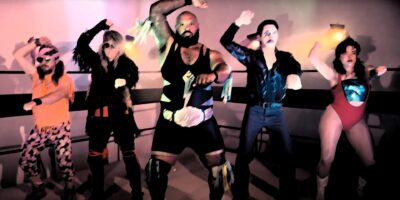
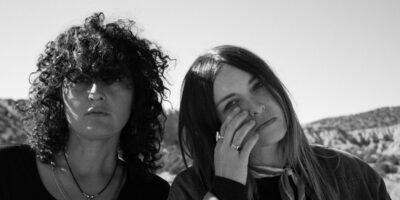
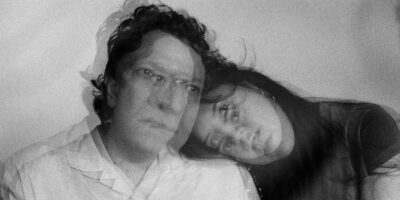




Comments